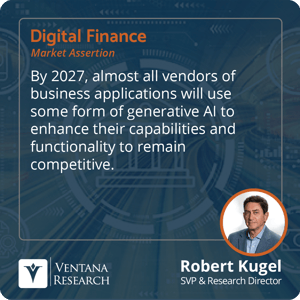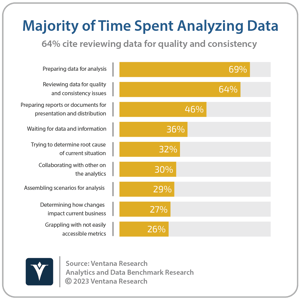SuiteWorld, the annual user conference from Oracle NetSuite, focused on three topics: artificial intelligence, a reimagination of the role NetSuite can play in managing an organization and emphasizing the value to existing customers of using more of what NetSuite has to offer.
AI has been a major theme in this year’s business software user group meetings, spurred by ChatGPT’s brilliant demonstration of the power of generative AI to non-technical people around the world. What has gone missing in the general discussion of AI and generative AI is a recognition that work on these technologies has been underway for decades and has finally reached the point of being introduced in significant ways in software offerings. Indeed, business software vendors have already introduced a range of new AI capabilities in offerings that, unlike the headline-grabbing futuristic use cases, have immediate practical business uses and can be easily structured to reduce risk.
AI-infused processes will be a competitive necessity going forward, so much so that Ventana Research asserts that by 2027, almost all vendors of business applications will find it competitively necessary to use some form of generative AI to enhance capabilities and functionality. For example, a key announcement from NetSuite was the availability of its Text Enhance capabilities that accelerate any business writing chore, including emails to customers and prospects, creating financial report or statement narratives, crafting job letters or writing product descriptions.
competitively necessary to use some form of generative AI to enhance capabilities and functionality. For example, a key announcement from NetSuite was the availability of its Text Enhance capabilities that accelerate any business writing chore, including emails to customers and prospects, creating financial report or statement narratives, crafting job letters or writing product descriptions.
In contrast to general-purpose generative AI systems, large language models can be trained on a specific corpus of business documents and data to ensure that material created by Text Enhance (and similar systems) conforms to the style and content of the company using it without endangering its intellectual property. The software produces an immediate first draft, which cuts down on the amount of time individuals spend agonizing over what words to put to paper. They instead adjust the generated text to fit their specific needs.
Oracle’s post-acquisition strategy of keeping NetSuite independent enables the latter to remain focused on the distinctive needs of midsize organizations while drawing on Oracle’s infrastructure and development resources. One example is NetSuite EPM, adapted from Oracle Enterprise Performance Management. The company currently offers separate planning, budgeting and account reconciliation applications derived from Oracle’s software and announced it will expand the list to profitability and cost management, tax reporting and narrative reporting applications over the next year. As midsize organizations grow, having software that makes planning, closing and profitability management processes more productive promotes agility, resiliency and competitiveness.
Oracle’s planning and budgeting software was classified as an Exemplary Vendor in our latest Business Planning Buyers Guide. For organizations that have operations outside North America, NetSuite is partnering with Avalara to facilitate value-added tax compliance, as a majority of companies mandate e-invoicing to combat VAT tax leakage and fraud.
NetSuite also announced additional capabilities for its Analytics Warehouse – a form of what I somewhat tongue-in-cheek call a “data pantry.” Vendors are increasingly offering methods for data storage created for a specific set of users and use cases in business-focused software. It’s a pantry because all the data one needs is readily available and easily accessible, with labels immediately recognized and understood by users of the application. In tech speak, this means the semantic layer is optimized for the intended audience. It is stocked with data gathered from multiple sources and immediately available for analysis, forecasting, planning and reporting.
for data storage created for a specific set of users and use cases in business-focused software. It’s a pantry because all the data one needs is readily available and easily accessible, with labels immediately recognized and understood by users of the application. In tech speak, this means the semantic layer is optimized for the intended audience. It is stocked with data gathered from multiple sources and immediately available for analysis, forecasting, planning and reporting.
This does away with the need for analysts to repeatedly perform data extraction, enrichment or transformation motions from the required source systems, practically eliminating the substantial amount of time analysts and business users routinely spend on data preparation.
The data pantry addresses long-standing issues that routinely sap the productivity of finance and business analysts and other users of business data. Our Analytics and Data Benchmark Research finds that 69% of organizations say that preparing data is one of the most time-consuming aspects of analyzing data. Sixty-four percent say reviewing data for quality and consistency is also an issue. Substantially reducing the need for unproductive data preparation routines will have a meaningful, positive impact on the productivity of analysts, enabling them to spend more time on more consequential work.
Any company with a software-as-a-service business model looks for ways to generate higher revenue from existing customers, mainly by adding users or expanding the breadth of products or services those customers use. One purpose of a user group meeting is to inspire attendees to want to do more with what the company offers by creating awareness of the additional capabilities and communicating their value. When attendees return to their jobs, it’s the task of customer service representatives to try to encourage this expansion, a task that history has shown to be a challenge. The addition of AI and generative AI features and capabilities and the emphasis on value streams may make it easier to get customers to consume more of what NetSuite has to offer. First, the addition of AI capabilities will materially enhance the business value of these offerings. And second, changing the paradigm from siloed clumps of functionality to coherent webs of business value can change how some estimate the business value of the software.
The market for business applications designed for midsize organizations is highly competitive and is likely to remain so. Artificial intelligence is providing individual vendors with the ability to offer more differentiated capabilities than has been the case for decades. In the past, innovation usually provided smaller upstarts with a competitive edge. AI is different in that larger vendors have a larger installed base. Not only does this give them the ability to spread the cost of AI innovation, it also gives them a broader set of data on which to train basic AI models before releasing them.
Midsize organizations have distinct needs for information technology, requiring many of the same capabilities as larger enterprises but with limited resources – chiefly money and personnel – to devote to IT. By reducing the resources required to gain sophisticated business application capabilities, the cloud has leveled the playing field for midsize organizations. For them, Oracle NetSuite offers a rich set of applications and capabilities that improve business performance. I recommend that midsize organizations evaluate NetSuite to address requirements for business applications.
Regards,
Robert Kugel

 competitively necessary to use some form of generative AI to enhance capabilities and functionality. For example, a key announcement from NetSuite was the availability of its
competitively necessary to use some form of generative AI to enhance capabilities and functionality. For example, a key announcement from NetSuite was the availability of its  for data storage created for a specific set of users and use cases in business-focused software. It’s a pantry because all the data one needs is readily available and easily accessible, with labels immediately recognized and understood by users of the application. In tech speak, this means the semantic layer is optimized for the intended audience. It is stocked with data gathered from multiple sources and immediately available for analysis, forecasting, planning and reporting.
for data storage created for a specific set of users and use cases in business-focused software. It’s a pantry because all the data one needs is readily available and easily accessible, with labels immediately recognized and understood by users of the application. In tech speak, this means the semantic layer is optimized for the intended audience. It is stocked with data gathered from multiple sources and immediately available for analysis, forecasting, planning and reporting.








